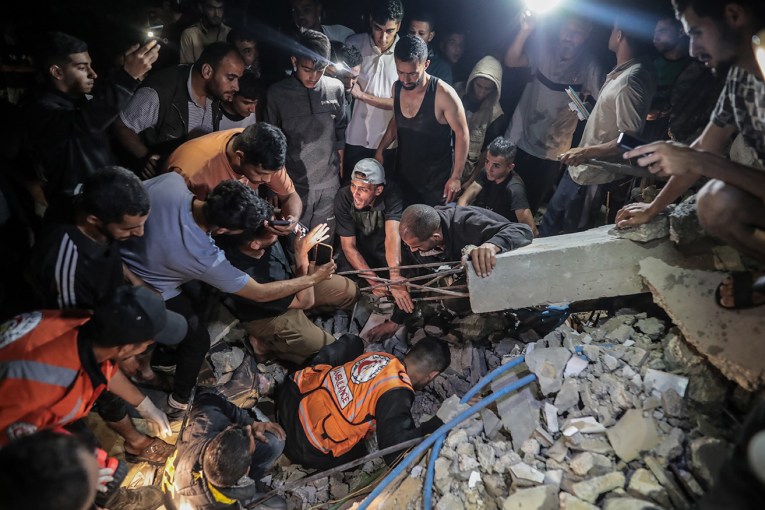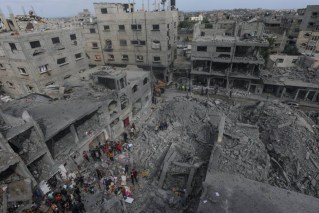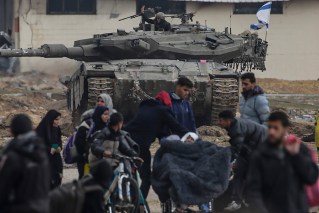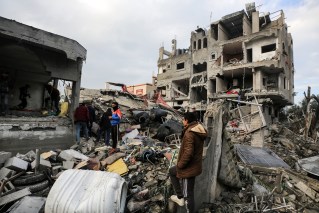US refuses to help Israel strike back at Iran

President Joe Biden, along with members of his national security team, receive an update on an ongoing airborne attack on Israel from Iran Photo: AAP
President Joe Biden warned Prime Minister Benjamin Netanyahu the US will not take part in a counter-offensive against Iran, after a mass drone and missile attack on Israeli territory, White House officials said.
Israel says it has made plans for offensive and defensive action in response to Iran’s bombardment, but Iran says any retaliation would escalate hostilities.
The threat of open warfare erupting between the Middle East foes and dragging in the United States has put the region on edge, triggering calls for restraint from global powers and Arab nations to avoid further escalation.
Tweet from @SkyNews
The US will continue to help Israel defend itself but does not want war, John Kirby, the White House’s top national security spokesperson, told ABC’s This Week program on Sunday.
Jordan’s King Abdullah told Biden in a phone call on Sunday that any further escalation from Israel would widen the conflict in the region, Jordanian state media reported.
Iran launched the attack over a suspected Israeli strike on its embassy compound in Syria on April 1 that killed top Revolutionary Guards commanders and followed months of clashes between Israel and Iran’s regional allies, triggered by the war in Gaza.
However, the attack by more than 300 missiles and drones, mostly launched from inside Iran, caused only modest damage in Israel as most were shot down by Israel’s Iron Dome defence system, with help from the US, Britain and Jordan.
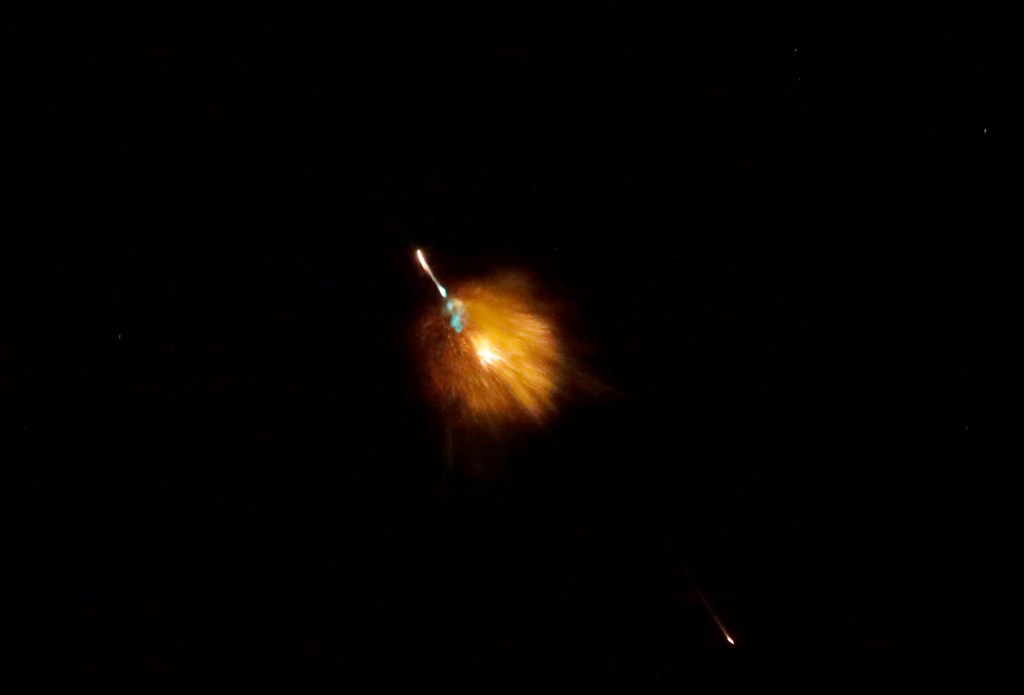
A view from the southern Gaza strip shows drones or missiles vying for targets in southern Israel. Photo: AAP
An Air Force base in southern Israel was hit but continued to operate as normal and a seven-year-old child was seriously hurt by shrapnel. There were no other reports of serious damage.
Two senior Israeli ministers signalled on Sunday that retaliation by Israel was not imminent and that it would not act alone.
“We will build a regional coalition and exact the price from Iran in the fashion and timing that is right for us,” centrist minister Benny Gantz said ahead of a war cabinet meeting.
Defence Minister Yoav Gallant also said Israel had an opportunity to form a strategic alliance “against this grave threat by Iran which is threatening to mount nuclear explosives on these missiles, which could be an extremely grave threat,” he said.
Israel remains on high alert with emergency measures expected to remain in place until late on Monday, including a ban on school activities and caps on large gatherings.
“Over the last few hours, we approved operational plans for both offensive and defensive action,” Rear Admiral Daniel Hagari said in a televised statement.
Iranian army chief of staff Major General Mohammad Bagheri said: “Our response will be much larger than tonight’s military action if Israel retaliates against Iran.” US bases could also be attacked if it helped Israel retaliate, he added.
Iran said the attack was aimed at punishing “Israeli crimes”, but it now “deemed the matter concluded.”
Russia, China, France and Germany, as well as Arab states Egypt, Qatar, Turkey and the United Arab Emirates, urged restraint, and the UN Security Council was set to meet later on Sunday local time.
The leaders of the Group of 7 nations condemned Iran’s attack and said they would work to stabilise the situation, warning Tehran risked “an uncontrollable regional escalation.”
Analysts debated how far Iran’s attack was calibrated to cause genuine devastation in Israel, or to save face at home after vows of revenge while avoiding a major new war.
Tehran likely took into consideration “a very, very strong multi-layer anti-missile system,” former senior Mossad official at the Institute for National Security Studies in Tel Aviv Sima Shine said.
But if Iran was hoping for a muted response, like with its missile attacks on US forces in Iraq after the killing of Guards commander Qassem Soleimani in 2020, she warned “I don’t think Israel sees it this way”.
In Gaza, Iran’s attack drew applause from many Palestinians as rare payback for the Israeli offensive on their enclave that has killed at least 33,000 people.
The war in Gaza, which Israel invaded after an attack by Iran-backed Hamas on October 7, has spread to fronts with Iran-aligned groups in Lebanon, Syria, Yemen and Iraq.
The Israeli prime minister has for years advocated a tough military line against Iran, pushing the United States for harder action over Tehran’s nuclear program and its backing for Hezbollah, Hamas and other groups in the region.
Ukraine wants same support
Ukrainian President Volodymyr Zelenskiy has condemned Iran’s drone and missile attack on Israel and said his country needed help from its allies to fend off threats from the air, just as Israel did.
Zelenskiy again called on the US Congress to approve a vital aid package that has been blocked by political wrangling for months.
Ukraine’s forces are facing new onslaughts from Russian troops in the east and daily attacks on cities and infrastructure from Russian missiles and drones.
Writing on the social media platform X on Sunday, Zelenskiy said: “Iran’s actions threaten the entire region and the world, just as Russia’s actions threaten a larger conflict, and the obvious collaboration between the two regimes in spreading terror must face a resolute and united response from the world.”
Tweet from @ZelenskyyUa
Steve Scalise, majority leader in the US House of Representatives, said on Saturday in response to the Iranian attack that the House would change its schedule to consider legislation that supports Israel and holds Iran accountable.
It was not immediately clear to which legislation he was referring.
Iran has supplied thousands of Shahed kamikaze drones to Russia throughout its invasion of Ukraine launched in February 2022. They have been used to exhaust Ukrainian air defences and hit infrastructure far from the front lines.
Zelenskiy for months has urged Ukraine’s Western allies, particularly the United States, to summon the “political will” to provide the air defences and weaponry Ukraine needs.
The president on Saturday said Germany would supply a US-made Patriot air defence system and air defence missiles to Ukraine at a “critical time”.
—AAP
